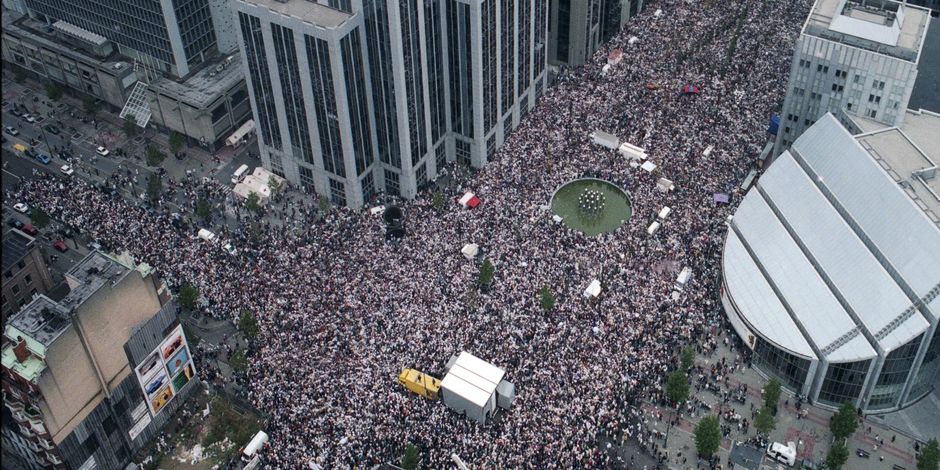A "Black March" to denounce the conditional release of serial child killer Marc Dutroux's accomplice is set to take place on the 23rd anniversary of a historic protest held in memory of the pair's victims.
Calls to take part in the peaceful march were launched following news that a court had approved a request by Michel Lelièvre, who played an active role in abducting Dutroux's six teenage victims, to be conditionally released before serving out his full sentence.
"React now. For our children," the organisers wrote in a Facebook group created for the event, which, within hours, totalled more than 300 members.
The event was launched by two people who took part in the historic White March of 20 October 1996, which saw at least 300,000 people march through Brussels in memory of the victims of Marc Dutroux and Lelièvre following their arrest.
Organised by the victims' parents, citizens from regions across Belgium gathered in Brussels for the march, in which some estimates say half a million people took part.
The organisers chose to hold the upcoming march on the same date in order to send out a symbolic message of opposition to Lelièvre's release, which hinges on whether he can find accommodation in six months' time.
"We chose the date of 20 October because it will be a symbol: the sad anniversary of the march of 1996," the organisers said, according to BX1.
"We chose black because it will be a day of grieving for our country," they wrote, adding that the goal of the event was to remain peaceful in order to send out their message "with dignity."
"Never again do we want our country to go through similar horrors," the organisers said.
'We don't want him as our neighbour'
Lelièvre has been imprisoned for 23 years for being one of four people, including Dutroux and his wife, who participated in the abduction of six girls aged 8 to 19 in the mid-90s.
Held in a cellar where two of them were killed and two died of starvation, the victims were repeatedly raped and tortured by Dutroux.
The criminal case shocked Belgium and the international community and led to calls by the incumbent royals at the time for the government to pass wide-ranging reforms to better integrate police in Belgium.
"We believe that Michel Lelièvre does not have a place in society, we don't want him as our neighbour," the march's Facebook page reads.
"Soon we will have the same problem regarding Marc Dutroux, so we must sound the alarm bell NOW to say STOP," the organisers wrote.
News of the march also coincides with reports that a criminal court in Brussels will hold a hearing following a request by Dutroux to be released under parole.
After news broke that Lelièvre's request to be conditionally released was approved, his lawyer, Benjamine Bovy, said the court's choice was "pragmatic," since it would allow for Lelièvre to be subject to judicial scrutiny following his release.
In contrast to the Brussels march of the 90s, organisers of the upcoming "Black March" said the demonstration would depart from the Walloon Brabant and march to Ittre, a Walloon town near Waterloo where Lelièvre is being held.
Gabriela Galindo
The Brussels Times

